University Finance: Critical Assessment on Professional Development
VerifiedAdded on 2023/04/06
|6
|1132
|182
Report
AI Summary
This report provides a critical assessment of a finance student's professional development, focusing on their career aspirations to become a financial investment advisor. The student expresses a strong interest in financial markets and portfolio management, highlighting the dynamic nature of the field and the potential for high returns. They discuss their current coursework, including stock markets, derivatives, and financial instruments, which is building a strong foundation for their future career. The student outlines their motivations, driven by the risks and uncertainties inherent in the financial market, and the importance of sound decision-making. They identify the necessary skills for the profession, including judgment, decision-making, and communication. The report applies the SMART framework to outline specific, measurable, attainable, relevant, and timely goals for their professional development. The student estimates it will take approximately three years to achieve their goals. The report includes references to support the student's analysis and viewpoint.
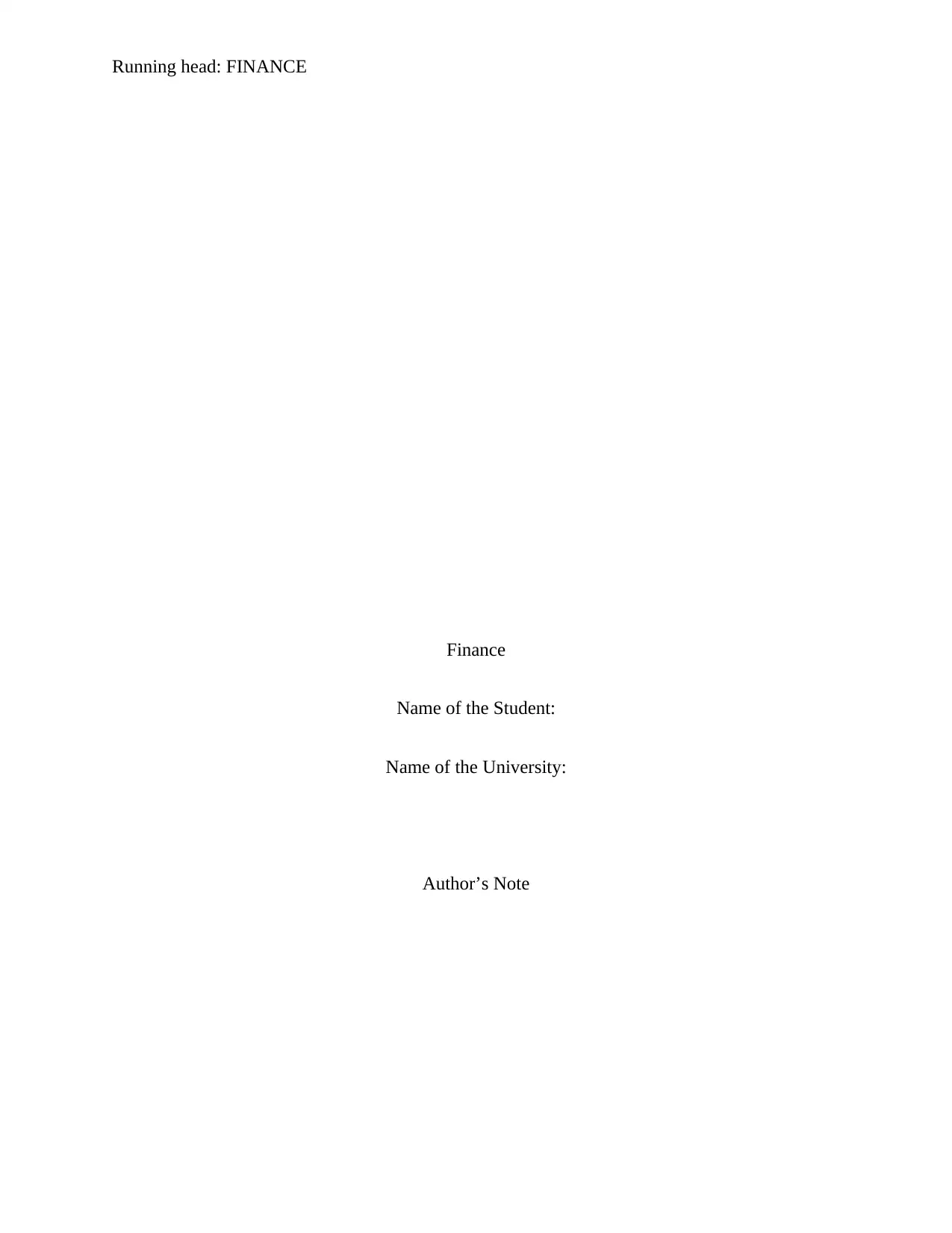
Running head: FINANCE
Finance
Name of the Student:
Name of the University:
Author’s Note
Finance
Name of the Student:
Name of the University:
Author’s Note
Paraphrase This Document
Need a fresh take? Get an instant paraphrase of this document with our AI Paraphraser
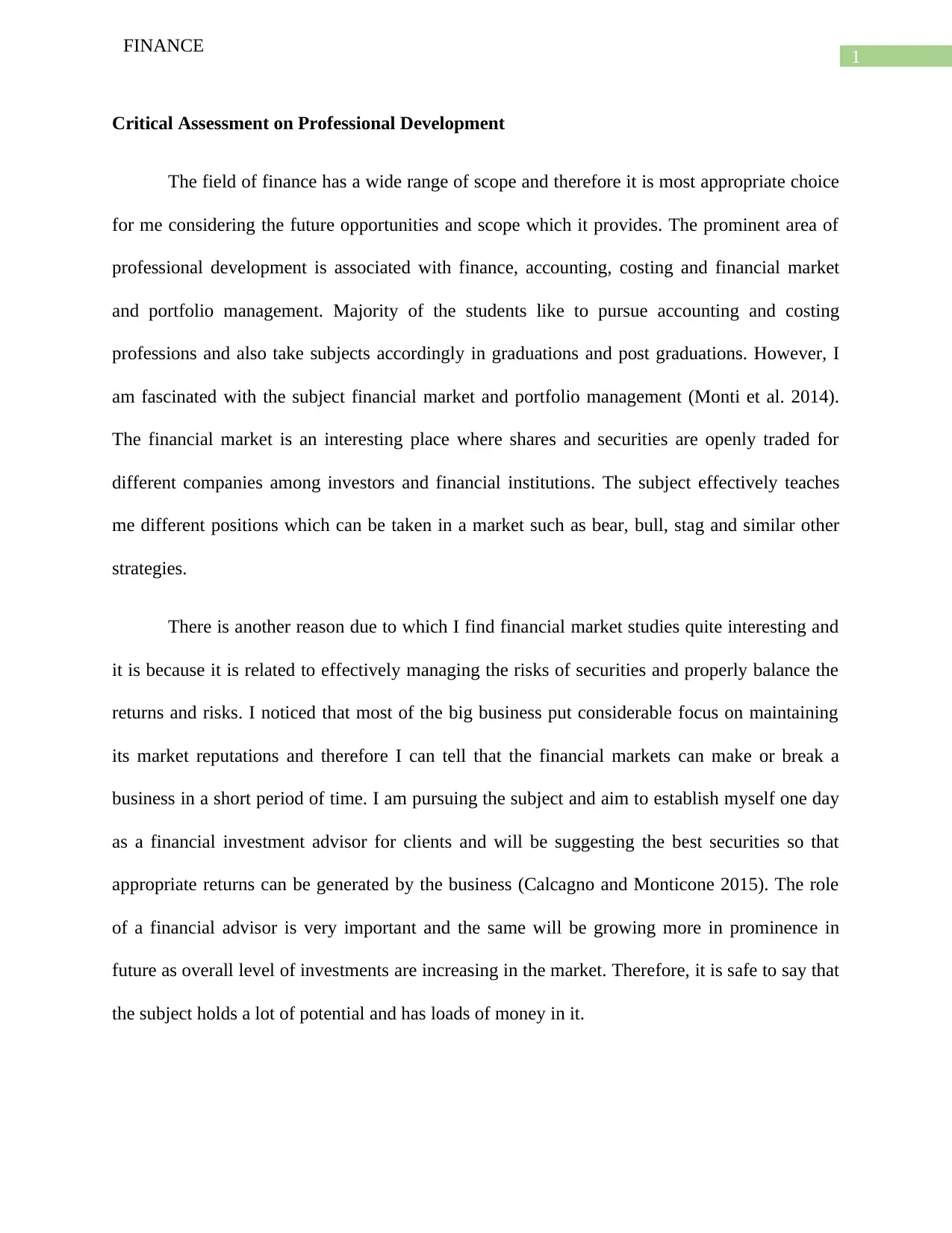
1
FINANCE
Critical Assessment on Professional Development
The field of finance has a wide range of scope and therefore it is most appropriate choice
for me considering the future opportunities and scope which it provides. The prominent area of
professional development is associated with finance, accounting, costing and financial market
and portfolio management. Majority of the students like to pursue accounting and costing
professions and also take subjects accordingly in graduations and post graduations. However, I
am fascinated with the subject financial market and portfolio management (Monti et al. 2014).
The financial market is an interesting place where shares and securities are openly traded for
different companies among investors and financial institutions. The subject effectively teaches
me different positions which can be taken in a market such as bear, bull, stag and similar other
strategies.
There is another reason due to which I find financial market studies quite interesting and
it is because it is related to effectively managing the risks of securities and properly balance the
returns and risks. I noticed that most of the big business put considerable focus on maintaining
its market reputations and therefore I can tell that the financial markets can make or break a
business in a short period of time. I am pursuing the subject and aim to establish myself one day
as a financial investment advisor for clients and will be suggesting the best securities so that
appropriate returns can be generated by the business (Calcagno and Monticone 2015). The role
of a financial advisor is very important and the same will be growing more in prominence in
future as overall level of investments are increasing in the market. Therefore, it is safe to say that
the subject holds a lot of potential and has loads of money in it.
FINANCE
Critical Assessment on Professional Development
The field of finance has a wide range of scope and therefore it is most appropriate choice
for me considering the future opportunities and scope which it provides. The prominent area of
professional development is associated with finance, accounting, costing and financial market
and portfolio management. Majority of the students like to pursue accounting and costing
professions and also take subjects accordingly in graduations and post graduations. However, I
am fascinated with the subject financial market and portfolio management (Monti et al. 2014).
The financial market is an interesting place where shares and securities are openly traded for
different companies among investors and financial institutions. The subject effectively teaches
me different positions which can be taken in a market such as bear, bull, stag and similar other
strategies.
There is another reason due to which I find financial market studies quite interesting and
it is because it is related to effectively managing the risks of securities and properly balance the
returns and risks. I noticed that most of the big business put considerable focus on maintaining
its market reputations and therefore I can tell that the financial markets can make or break a
business in a short period of time. I am pursuing the subject and aim to establish myself one day
as a financial investment advisor for clients and will be suggesting the best securities so that
appropriate returns can be generated by the business (Calcagno and Monticone 2015). The role
of a financial advisor is very important and the same will be growing more in prominence in
future as overall level of investments are increasing in the market. Therefore, it is safe to say that
the subject holds a lot of potential and has loads of money in it.
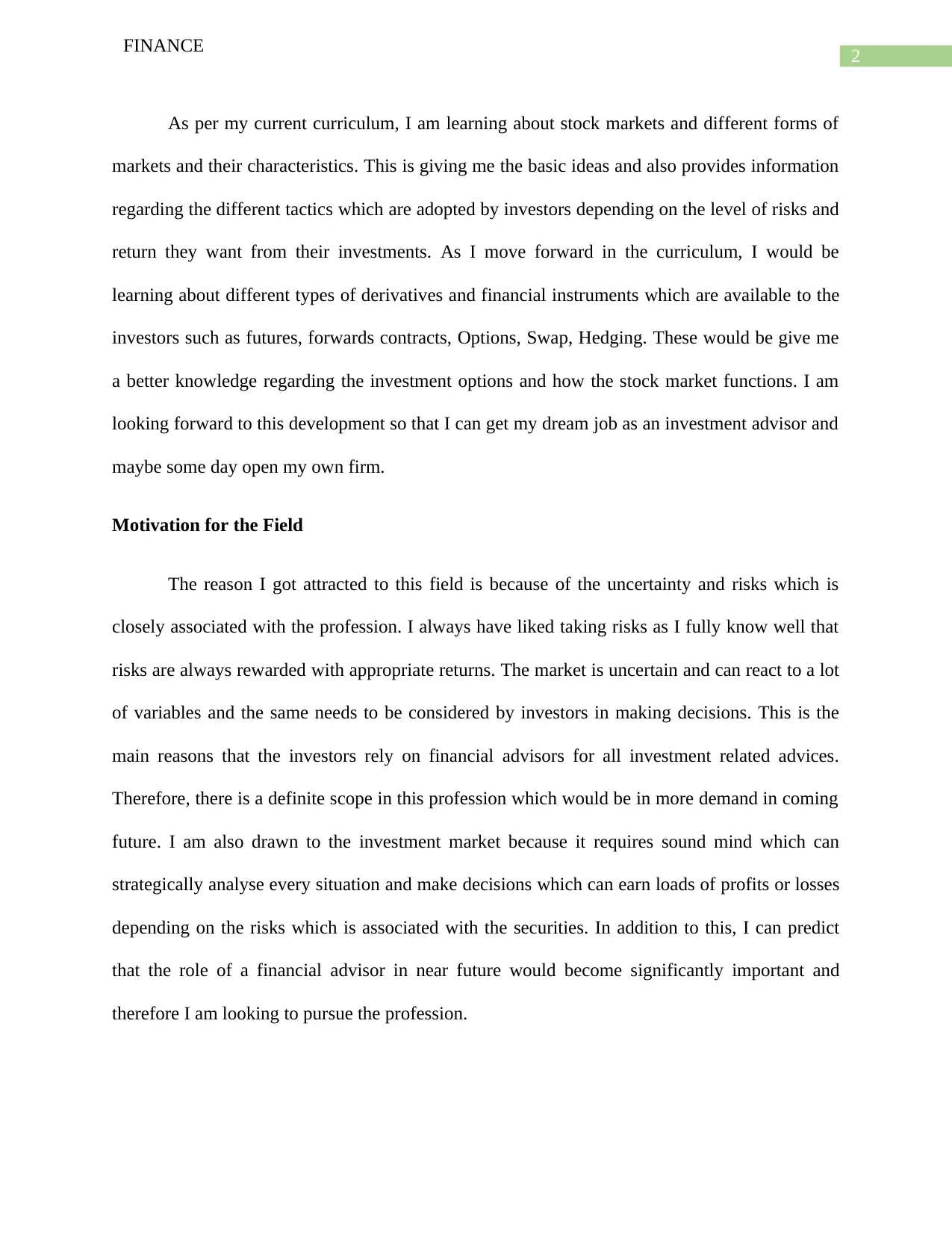
2
FINANCE
As per my current curriculum, I am learning about stock markets and different forms of
markets and their characteristics. This is giving me the basic ideas and also provides information
regarding the different tactics which are adopted by investors depending on the level of risks and
return they want from their investments. As I move forward in the curriculum, I would be
learning about different types of derivatives and financial instruments which are available to the
investors such as futures, forwards contracts, Options, Swap, Hedging. These would be give me
a better knowledge regarding the investment options and how the stock market functions. I am
looking forward to this development so that I can get my dream job as an investment advisor and
maybe some day open my own firm.
Motivation for the Field
The reason I got attracted to this field is because of the uncertainty and risks which is
closely associated with the profession. I always have liked taking risks as I fully know well that
risks are always rewarded with appropriate returns. The market is uncertain and can react to a lot
of variables and the same needs to be considered by investors in making decisions. This is the
main reasons that the investors rely on financial advisors for all investment related advices.
Therefore, there is a definite scope in this profession which would be in more demand in coming
future. I am also drawn to the investment market because it requires sound mind which can
strategically analyse every situation and make decisions which can earn loads of profits or losses
depending on the risks which is associated with the securities. In addition to this, I can predict
that the role of a financial advisor in near future would become significantly important and
therefore I am looking to pursue the profession.
FINANCE
As per my current curriculum, I am learning about stock markets and different forms of
markets and their characteristics. This is giving me the basic ideas and also provides information
regarding the different tactics which are adopted by investors depending on the level of risks and
return they want from their investments. As I move forward in the curriculum, I would be
learning about different types of derivatives and financial instruments which are available to the
investors such as futures, forwards contracts, Options, Swap, Hedging. These would be give me
a better knowledge regarding the investment options and how the stock market functions. I am
looking forward to this development so that I can get my dream job as an investment advisor and
maybe some day open my own firm.
Motivation for the Field
The reason I got attracted to this field is because of the uncertainty and risks which is
closely associated with the profession. I always have liked taking risks as I fully know well that
risks are always rewarded with appropriate returns. The market is uncertain and can react to a lot
of variables and the same needs to be considered by investors in making decisions. This is the
main reasons that the investors rely on financial advisors for all investment related advices.
Therefore, there is a definite scope in this profession which would be in more demand in coming
future. I am also drawn to the investment market because it requires sound mind which can
strategically analyse every situation and make decisions which can earn loads of profits or losses
depending on the risks which is associated with the securities. In addition to this, I can predict
that the role of a financial advisor in near future would become significantly important and
therefore I am looking to pursue the profession.
⊘ This is a preview!⊘
Do you want full access?
Subscribe today to unlock all pages.

Trusted by 1+ million students worldwide
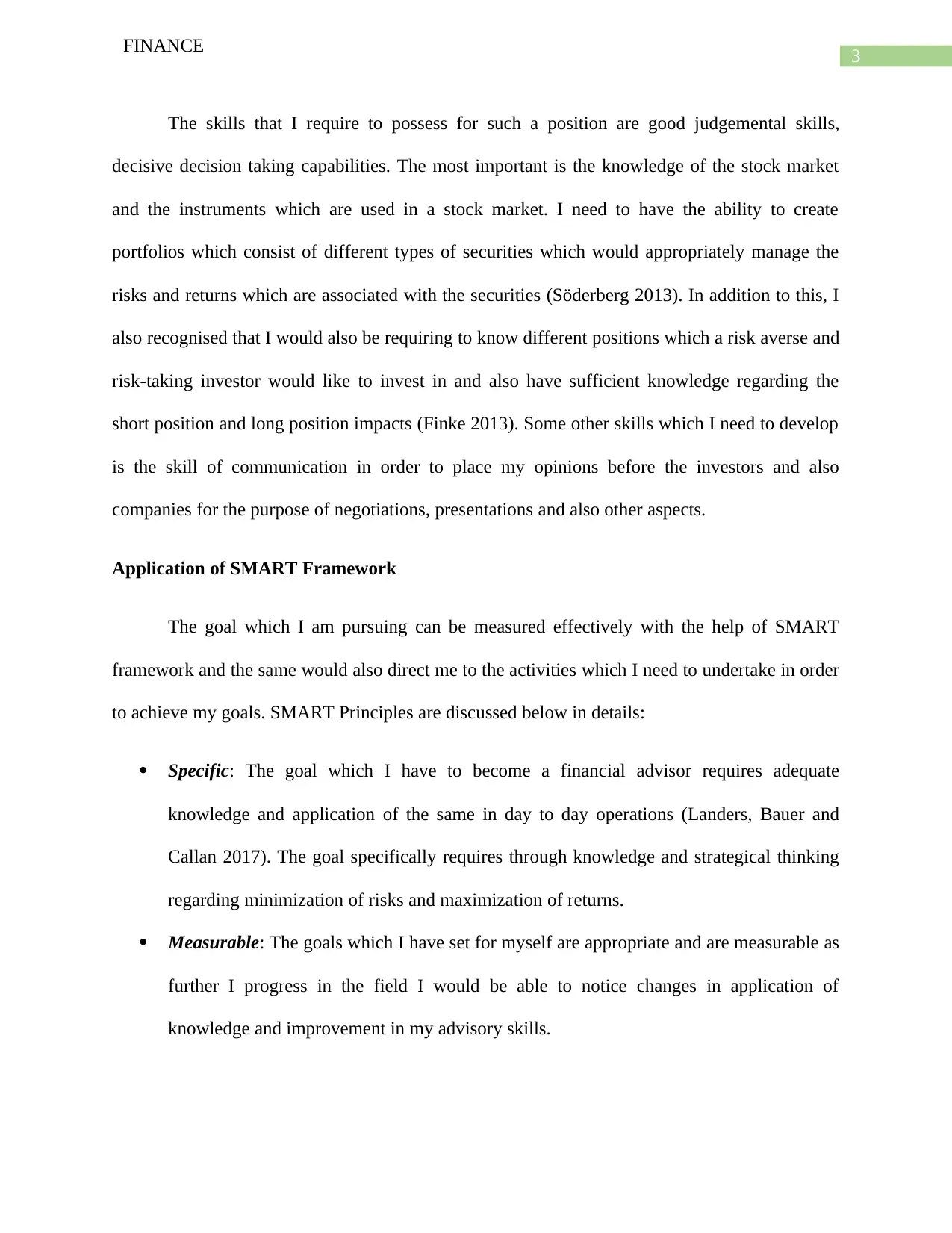
3
FINANCE
The skills that I require to possess for such a position are good judgemental skills,
decisive decision taking capabilities. The most important is the knowledge of the stock market
and the instruments which are used in a stock market. I need to have the ability to create
portfolios which consist of different types of securities which would appropriately manage the
risks and returns which are associated with the securities (Söderberg 2013). In addition to this, I
also recognised that I would also be requiring to know different positions which a risk averse and
risk-taking investor would like to invest in and also have sufficient knowledge regarding the
short position and long position impacts (Finke 2013). Some other skills which I need to develop
is the skill of communication in order to place my opinions before the investors and also
companies for the purpose of negotiations, presentations and also other aspects.
Application of SMART Framework
The goal which I am pursuing can be measured effectively with the help of SMART
framework and the same would also direct me to the activities which I need to undertake in order
to achieve my goals. SMART Principles are discussed below in details:
Specific: The goal which I have to become a financial advisor requires adequate
knowledge and application of the same in day to day operations (Landers, Bauer and
Callan 2017). The goal specifically requires through knowledge and strategical thinking
regarding minimization of risks and maximization of returns.
Measurable: The goals which I have set for myself are appropriate and are measurable as
further I progress in the field I would be able to notice changes in application of
knowledge and improvement in my advisory skills.
FINANCE
The skills that I require to possess for such a position are good judgemental skills,
decisive decision taking capabilities. The most important is the knowledge of the stock market
and the instruments which are used in a stock market. I need to have the ability to create
portfolios which consist of different types of securities which would appropriately manage the
risks and returns which are associated with the securities (Söderberg 2013). In addition to this, I
also recognised that I would also be requiring to know different positions which a risk averse and
risk-taking investor would like to invest in and also have sufficient knowledge regarding the
short position and long position impacts (Finke 2013). Some other skills which I need to develop
is the skill of communication in order to place my opinions before the investors and also
companies for the purpose of negotiations, presentations and also other aspects.
Application of SMART Framework
The goal which I am pursuing can be measured effectively with the help of SMART
framework and the same would also direct me to the activities which I need to undertake in order
to achieve my goals. SMART Principles are discussed below in details:
Specific: The goal which I have to become a financial advisor requires adequate
knowledge and application of the same in day to day operations (Landers, Bauer and
Callan 2017). The goal specifically requires through knowledge and strategical thinking
regarding minimization of risks and maximization of returns.
Measurable: The goals which I have set for myself are appropriate and are measurable as
further I progress in the field I would be able to notice changes in application of
knowledge and improvement in my advisory skills.
Paraphrase This Document
Need a fresh take? Get an instant paraphrase of this document with our AI Paraphraser
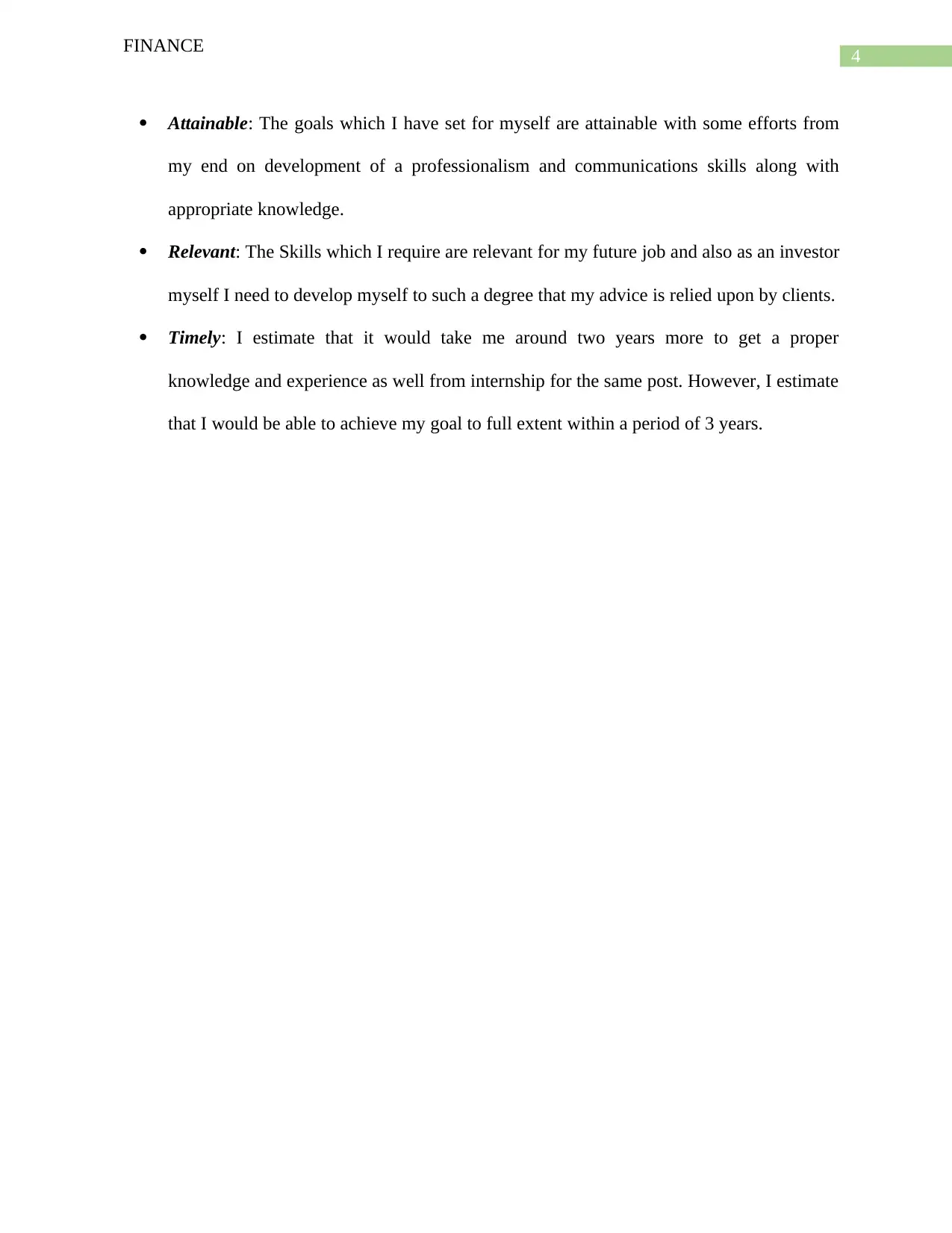
4
FINANCE
Attainable: The goals which I have set for myself are attainable with some efforts from
my end on development of a professionalism and communications skills along with
appropriate knowledge.
Relevant: The Skills which I require are relevant for my future job and also as an investor
myself I need to develop myself to such a degree that my advice is relied upon by clients.
Timely: I estimate that it would take me around two years more to get a proper
knowledge and experience as well from internship for the same post. However, I estimate
that I would be able to achieve my goal to full extent within a period of 3 years.
FINANCE
Attainable: The goals which I have set for myself are attainable with some efforts from
my end on development of a professionalism and communications skills along with
appropriate knowledge.
Relevant: The Skills which I require are relevant for my future job and also as an investor
myself I need to develop myself to such a degree that my advice is relied upon by clients.
Timely: I estimate that it would take me around two years more to get a proper
knowledge and experience as well from internship for the same post. However, I estimate
that I would be able to achieve my goal to full extent within a period of 3 years.
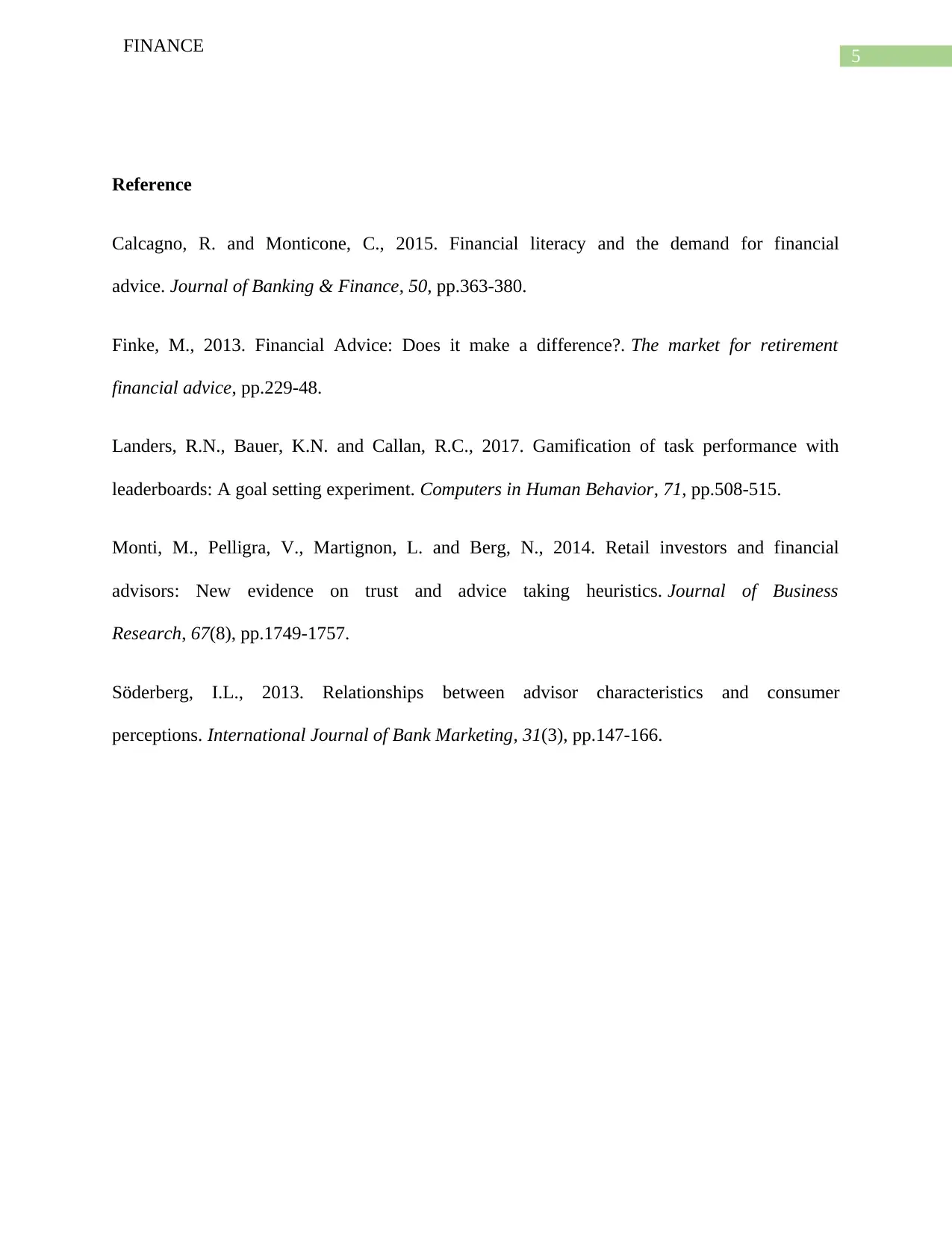
5
FINANCE
Reference
Calcagno, R. and Monticone, C., 2015. Financial literacy and the demand for financial
advice. Journal of Banking & Finance, 50, pp.363-380.
Finke, M., 2013. Financial Advice: Does it make a difference?. The market for retirement
financial advice, pp.229-48.
Landers, R.N., Bauer, K.N. and Callan, R.C., 2017. Gamification of task performance with
leaderboards: A goal setting experiment. Computers in Human Behavior, 71, pp.508-515.
Monti, M., Pelligra, V., Martignon, L. and Berg, N., 2014. Retail investors and financial
advisors: New evidence on trust and advice taking heuristics. Journal of Business
Research, 67(8), pp.1749-1757.
Söderberg, I.L., 2013. Relationships between advisor characteristics and consumer
perceptions. International Journal of Bank Marketing, 31(3), pp.147-166.
FINANCE
Reference
Calcagno, R. and Monticone, C., 2015. Financial literacy and the demand for financial
advice. Journal of Banking & Finance, 50, pp.363-380.
Finke, M., 2013. Financial Advice: Does it make a difference?. The market for retirement
financial advice, pp.229-48.
Landers, R.N., Bauer, K.N. and Callan, R.C., 2017. Gamification of task performance with
leaderboards: A goal setting experiment. Computers in Human Behavior, 71, pp.508-515.
Monti, M., Pelligra, V., Martignon, L. and Berg, N., 2014. Retail investors and financial
advisors: New evidence on trust and advice taking heuristics. Journal of Business
Research, 67(8), pp.1749-1757.
Söderberg, I.L., 2013. Relationships between advisor characteristics and consumer
perceptions. International Journal of Bank Marketing, 31(3), pp.147-166.
⊘ This is a preview!⊘
Do you want full access?
Subscribe today to unlock all pages.

Trusted by 1+ million students worldwide
1 out of 6
Related Documents
Your All-in-One AI-Powered Toolkit for Academic Success.
+13062052269
info@desklib.com
Available 24*7 on WhatsApp / Email
![[object Object]](/_next/static/media/star-bottom.7253800d.svg)
Unlock your academic potential
Copyright © 2020–2026 A2Z Services. All Rights Reserved. Developed and managed by ZUCOL.




